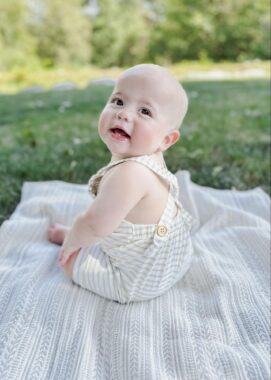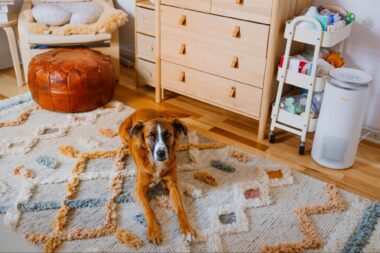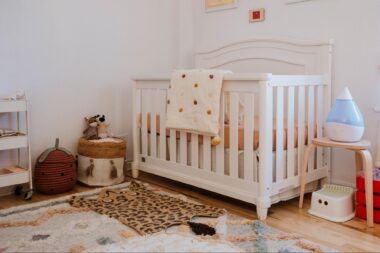Welcoming the beauty of spring can be a delightful experience for your family, especially with the arrival of longer, brighter days and the blossoming of flowers. It’s a season packed with new beginnings, perfect for creating joyful memories with your little one in their nursery. Understanding how to manage springtime allergies effectively can ensure that your baby enjoys this vibrant season comfortably, paving the way for a happy, healthy start to life.

Understanding Springtime Allergies in Babies
Before tackling the task of allergen-proofing your nursery, it’s essential to grasp the nature of the allergies your baby might face in the spring.
Common Spring Allergens
During spring, the air is thick with pollen from trees, grasses, and flowers. These tiny airborne invaders can find their way into every nook and cranny of your home, potentially causing allergic reactions in your baby.
Recognizing Symptoms Early
Babies can’t verbally communicate their discomfort, but allergies express themselves through various channels. Look out for symptoms such as:
- Frequent sneezing
- Nasal congestion or a runny nose
- Red, watery eyes
- Skin rashes or eczema flare-ups
- Difficulty breathing, often signaled by snoring or wheezing

When Do Allergy Symptoms Usually Start In Babies?
Allergy symptoms in babies can manifest at any time, but they often become noticeable when they are first exposed to allergens. In the context of springtime allergies, this could be as early as their first spring season. However, the timing can vary, and some infants may show signs of allergies only after repeated exposure to allergens. It is crucial for parents to monitor their babies for symptoms, especially during high pollen seasons or when introducing new foods, pets, or environments that could trigger allergies. Being vigilant helps in early detection and management of allergy symptoms, ensuring your baby’s comfort and health.

Creating an Allergy-Friendly Nursery
A safe haven for your baby should be free from allergens as much as possible. Here are some tips to help you create an allergy-friendly nursery:
Keep It Clean
Regularly clean the room and surfaces in your baby’s nursery, as dust and other allergens can accumulate quickly. Use a damp cloth to wipe down furniture, shelves, toys, and other items that could easily harbor pollen or dust. Be sure to look for cleaning agents that are non-toxic and safe to use around your baby.
Wash Bedding, Clothes, and Toys Regularly
Wash your baby’s bedding frequently, at least once a week, using hot water to remove any dust or pollen that may have settled on them. Use a gentle detergent and avoid using fabric softeners or scented products that could trigger allergies. Remember to wash your baby’s clothes, blankets, and stuffed animals regularly too.
Use an Air Purifier
Invest in a good quality air purifier with a HEPA filter to remove allergens from the air in your baby’s nursery. Place it near their crib for maximum efficiency, especially during pollen-heavy seasons. Regularly change the filters and clean the unit according to the manufacturer’s instructions. Make sure when looking for an air purifier, that the coverage area matches the size of your nursery.
Keep Windows Closed
It may be tempting to open up the windows to let in fresh air, but this could also mean inviting pollen and other allergens into the nursery. Keeping windows closed can help reduce the amount of pollen in the room. If you need to air out the room, do so early in the morning or late in the evening when pollen counts are typically lower.

Use a Humidifier
Maintaining the right humidity level in your baby’s nursery can greatly reduce the discomfort caused by allergies. A humidifier adds moisture to the air, which can help ease nasal congestion and dry skin, common symptoms in babies with allergies. When selecting a humidifier, opt for a cool-mist type to avoid burns and make sure it’s easy to clean to prevent mold growth, which can be another allergen.
Limit Pets’ Access
If you have pets that shed, it’s best to keep them out of your baby’s nursery. Shedding can introduce allergens into the room and trigger allergies. Also, make sure to regularly groom and clean your pets to minimize the amount of dander and fur they shed.
Managing Allergies in Babies
Allergies in babies can be challenging to manage, but with patience and the right information, you can help your little one find relief.
Seeking Professional Advice
If you suspect that your baby is suffering from allergies, it’s crucial to seek medical advice from their pediatrician. They can help identify the specific allergen causing the reaction and recommend appropriate treatment options, such as over-the-counter antihistamines or allergy shots. It’s also essential to follow your doctor’s advice and regularly monitor your baby’s symptoms to ensure their allergies are properly managed.
Safely Alleviating Symptoms
Depending on the severity of the allergies, your pediatrician might recommend over-the-counter or prescription antihistamines. It’s crucial to follow their dosing instructions to ensure safety and efficacy.
When to Seek Further Help
In severe cases or if your baby is experiencing unusual symptoms, don’t hesitate to seek additional medical opinions, such as from an allergist or immunologist. Being an attentive parent is your strongest ally in combating allergies. By understanding and managing allergies, you can help your baby enjoy the wonders of springtime without discomfort.
Spring is a beautiful season filled with new beginnings, making it the perfect time to create joyful memories with your baby. With proper knowledge on managing and preventing springtime allergies, you can ensure that your little one stays healthy and happy throughout the season. Remember to always consult with your pediatrician and seek professional help if needed, as every baby’s allergies may differ.